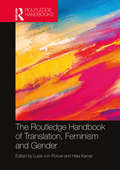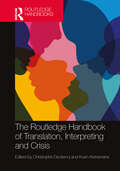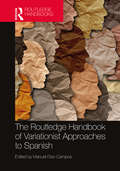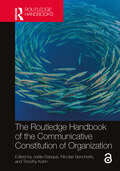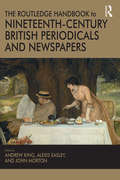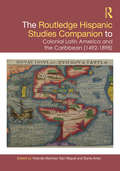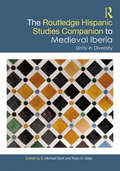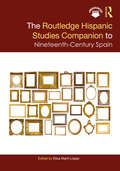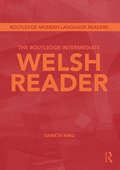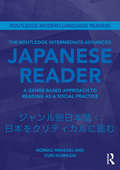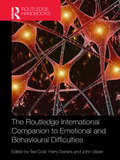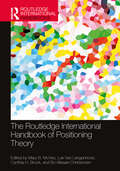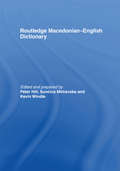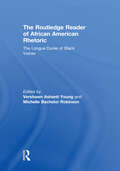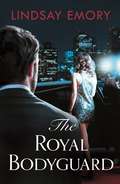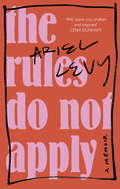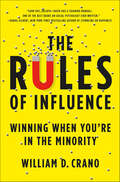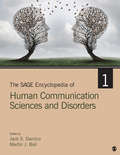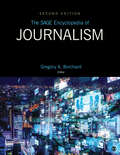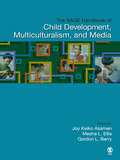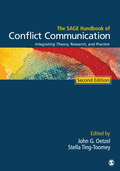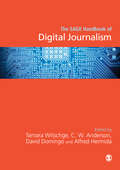- Table View
- List View
The Routledge Handbook of Translation, Feminism and Gender (Routledge Handbooks in Translation and Interpreting Studies)
by Luise Von Flotow Hala KamalThe Routledge Handbook of Translation, Feminism and Gender provides a comprehensive, state-of-the-art overview of feminism and gender awareness in translation and translation studies today. Bringing together work from more than 20 different countries – from Russia to Chile, Yemen, Turkey, China, India, Egypt and the Maghreb as well as the UK, Canada, the USA and Europe – this Handbook represents a transnational approach to this topic, which is in development in many parts of the world. With 41 chapters, this book presents, discusses, and critically examines many different aspects of gender in translation and its effects, both local and transnational. Providing overviews of key questions and case studies of work currently in progress, this Handbook is the essential reference and resource for students and researchers of translation, feminism, and gender.
The Routledge Handbook of Translation, Interpreting and Crisis (Routledge Handbooks in Translation and Interpreting Studies)
by Christophe Declercq Koen KerremansThis handbook offers a broad-ranging overview of the study of translating and interpreting in conflict and crisis settings and takes the field in new directions. Covering a wide selection of multimodal contexts that build on the fundamentals of translation, interpreting, and their in-between hybrid forms of mediation, the handbook is divided into four parts. The opening part covers perspectives on policy and practices, whether contemporary or historical, and cases truly span the globe, from Peru and Brazil, over Belgium and Sierra Leone, to Australia, Japan, and Hong Kong. International developments require profound considerations about the professionalisation of access to language in times of crises, not least in contexts of humanitarian negotiation or conflict zone interpreting–these form the second part. The subsequent part deals with spheres of community in which language needs are positioned within frames of agency, positionality, and trust, and the challenges that these face. The contributions build on cases where interpreters act as catalysts for translation needs in settings of humanitarian aid and beyond. The final part considers language strategies and solutions in crises. This handbook is the essential guide to translation and interpreting in conflict and crisis settings for advanced students and researchers of translation and interpreting studies and will be of wide interest in peace studies, political science, and beyond.
The Routledge Handbook of Variationist Approaches to Spanish (Routledge Spanish Language Handbooks)
by Manuel Díaz-CamposThe Routledge Handbook of Variationist Approaches to Spanish provides an up-to-date overview of the latest research examining sociolinguistic approaches to analyzing variation in Spanish. Divided into three sections, the book includes the most current research conducted in Spanish variationist sociolinguistics. This comprehensive volume covers phonological, morphosyntactic, social, and lexical variation in Spanish. Each section is further divided into subsections focusing on specific areas of language variation, highlighting the most salient and current developments in each subfield of Hispanic sociolinguistics. As such, this Handbook delves further into the details of topics relating to variation and change in Spanish than previous publications, with a focus on the symbolic sociolinguistic value of specific phenomena in the field. Encouraging readers to think critically about language variation, this book will be of interest to advanced undergraduate and graduate students, as well as researchers seeking to explore lesser-known areas of Hispanic sociolinguistics. The Routledge Handbook of Variationist Approaches to Spanish will be a welcome addition to specialists and students in the fields of linguistics, Hispanic linguistics, sociolinguistics, and linguistic anthropology.
The Routledge Handbook of the Communicative Constitution of Organization (Routledge Studies in Communication, Organization, and Organizing)
by Joëlle BasqueThis Handbook offers state of the art scholarship on the perspective known as the Communicative Constitution of Organization (CCO). Offering a unique outlook on how communication accounts for the emergence, change, and continuity of organizations and organizing practices, this Handbook systematically exposes the theoretical and methodological underpinnings of CCO, displays its empirical diversity, and articulates its future trajectory. Placing communication firmly at the centre of the organizational equation, an international team of expert authors covers: The key theoretical inspirations and the main themes of the field The debates that animate the CCO community CCO’s methodological approaches How CCO handles classic management themes Practical applications Offering a central statement of CCO’s contributions to the fields of organization studies, communication, and management, this Handbook will be of interest to organization studies and communication scholars, faculty, and graduate and advanced undergraduate students, as well as anyone associated with CCO theorizing seeking a comprehensive overview of the theoretical, methodological, and practical tenets of this growing area.
The Routledge Handbook to Nineteenth-Century British Periodicals and Newspapers
by John Morton Andrew King Alexis EasleyProviding a comprehensive, interdisciplinary examination of scholarship on nineteenth-century British periodicals, this volume surveys the current state of research and offers researchers an in-depth examination of contemporary methodologies. The impact of digital media and archives on the field informs all discussions of the print archive. Contributors illustrate their arguments with examples and contextualize their topics within broader areas of study, while also reflecting on how the study of periodicals may evolve in the future. The Handbook will serve as a valuable resource for scholars and students of nineteenth-century culture who are interested in issues of cultural formation, transformation, and transmission in a developing industrial and globalizing age, as well as those whose research focuses on the bibliographical and the micro case study. In addition to rendering a comprehensive review and critique of current research on nineteenth-century British periodicals, the Handbook suggests new avenues for research in the twenty-first century.
The Routledge Hispanic Studies Companion to Colonial Latin America and the Caribbean (Routledge Companions to Hispanic and Latin American Studies)
by Yolanda Martínez-San Miguel Santa AriasThe Routledge Hispanic Studies Companion to Colonial Latin America and the Caribbean (1492-1898) brings together an international team of scholars to explore new interdisciplinary and comparative approaches for the study of colonialism. Using four overarching themes, the volume examines a wide array of critical issues, key texts, and figures that demonstrate the significance of Colonial Latin America and the Caribbean across national and regional traditions and historical periods. This invaluable resource will be of interest to students and scholars of Spanish and Latin American studies examining colonial Caribbean and Latin America at the intersection of cultural and historical studies; transatlantic, postcolonial and decolonial studies; and critical approaches to archives and materiality. This timely volume assesses the impact and legacy of colonialism and coloniality.
The Routledge Hispanic Studies Companion to Medieval Iberia: Unity in Diversity (Routledge Companions to Hispanic and Latin American Studies)
by E. Michael Gerli and Ryan D. GilesThe Routledge Hispanic Studies Companion to Medieval Iberia: Unity in Diversity draws together the innovative work of renowned scholars as well as several thought-provoking essays from emergent academics, in order to provide broad-range, in-depth coverage of the major aspects of the Iberian medieval world. Exploring the social, political, cultural, religious, and economic history of the Iberian Peninsula, the volume includes 37 original essays grouped around fundamental themes such as Languages and Literatures, Spiritualities, and Visual Culture. This interdisciplinary volume is an excellent introduction and reference work for students and scholars in Iberian Studies and Medieval Studies. SERIES EDITOR: BRAD EPPS SPANISH LIST ADVISOR: JAVIER MUÑOZ-BASOLS
The Routledge Hispanic Studies Companion to Nineteenth-Century Spain (Routledge Companions to Hispanic and Latin American Studies)
by Elisa Martí-LópezThe Routledge Hispanic Studies Companion to Nineteenth-Century Spain brings together an international team of expert contributors in this critical and innovative volume that redefines nineteenth-century Spain in a multi-national, multi-lingual, and transnational way. This interdisciplinary volume examines questions moving beyond the traditional concept of Spain as a singular, homogenous entity to a new understanding of Spain as an unstable set of multipolar and multilinguistic relations that can be inscribed in different translational ways. This invaluable resource will be of interest to advanced students and scholars in Hispanic Studies.
The Routledge Intermediate Welsh Reader
by Gareth KingThe Routledge Intermediate Welsh Reader is a comprehensive reader designed to provide varied, stimulating and up-to-date reading material for learners of Welsh at the intermediate level. The Welsh Reader provides a bridge between basic literacy skills and the ability to read full novels and newspapers in Welsh. It consists of thirty-five authentic readings, graded on the basis of complexity of vocabulary, grammar and syntax. These readings are drawn from a range of contemporary sources such as newspapers and magazines as well as novels and historical works. It is ideal for learners who already possess a knowledge of essential grammar and vocabulary and who wish to expand their knowledge of the language through contextualized reading material. Key features include: extracts of modern literature and newspaper/magazine articles vocabulary lists for quick reference short grammar explanations of any complicated structures initial consonant mutations marked typographically comprehension and discussion questions full answer key Suitable for both class use and independent study, The Routledge Intermediate Welsh Reader is an essential tool for facilitating vocabulary learning and increasing reading proficiency.
The Routledge Intermediate to Advanced Japanese Reader: A Genre-Based Approach to Reading as a Social Practice
by Noriko Iwasaki Yuri KumagaiThe Routledge Intermediate to Advanced Japanese Reader: A Genre-Based Approach to Reading as a Social Practice is designed for intermediate to advanced learners of Japanese and presents twenty-five authentic texts taken from a wide range of media and literary sources, which promote a deeper understanding of Japan among readers. The book is divided into ten genre-based chapters, allowing the learner to focus on the textual features relevant to that genre. Key features include: Selected texts covering topics related to Japanese language, society and culture encountered in the Japanese media, from news reports to interviews, book reviews, short stories and editorials. Word lists for challenging vocabulary and kanji provided throughout to aid comprehension and learning. Pre-reading activities to enable familiarity with the topic, the text’s background and words to be encountered in the reading passages. Short grammar explanations of essential structures. Questions to help comprehension, raise awareness of genre features, promote critical reading, and to encourage the reader to think more deeply about the content. Opportunities to write passages, utilizing what has been learned by reading the text. Vocabulary and grammar lists at the back of the book. The Routledge Intermediate to Advanced Japanese Reader emphasizes reading as a purposeful social act, which requires readers to make meaning of the text by considering the authors’ choices in language (scripts, vocabulary, styles) in the text. The learners are guided to situate each text in society (for example, the author, target audience, social-cultural background related to the subject) in order to understand the social significance of reading and writing. This book aims to help learners develop the ability to critically read and write in Japanese for their own social purposes. It is suitable for both class use and independent study.
The Routledge International Companion to Emotional and Behavioural Difficulties
by Harry Daniels Ted Cole John VisserResponding to disruptive or troubled pupils with emotional and behavioural difficulties (EBD) remains a highly topical issue. The challenges these children present relate to wider issues of continuing political concern: the perceived declining discipline in schools; school and social exclusion; the limits to inclusion for children with special needs; increasing mental health difficulties in children; youth crime and parenting skills. It’s little wonder that the 'EBD' (often known as ‘BESD’ or ‘SEBD’) category is one of the most common forms of SEN around the world. This topical and exhaustively-researched Companion examines the difficulties of defining EBD, and the dangers of allocating this imprecise label to children. Bringing together the work of contributors from fifteen countries and across four continents, this book features the research of leading experts in the global field of EBD, who discuss and debate educators’ key concerns by: looking at the overlaps between EBD, ADHD and mental health difficulties; outlining the types of appropriate schooling for children with EBD; urging readers to look beyond pupils’ challenging behaviour in order to understand and respond to the social, biological and psychological causation; considering the key areas of assessment, whole-school and targeted approaches that help pupils with EBD in mainstream and in special settings; outlining helpful work with families, the crucial contribution of effective multi-agency working and the importance of supporting and developing teachers who work with challenging pupils. Containing contrasting views on controversial topics, this Companion’s approachable style makes it an essential reference book for academics, policy makers, practitioners, educators and students who are working towards a higher degree in education.
The Routledge International Handbook of Positioning Theory (Routledge International Handbooks)
by Luk Van Langenhove Cynthia H. Brock Mary B. McVee Bo Allesøe ChristensenThis handbook is the first of its kind to explore Positioning Theory. Taking inspiration from the groundwork set by Rom Harré and collaborators such as Bronwyn Davies, Fathali Moghaddam, Luk Van Langenhove, and others the book explores the emergence, historical context, and disciplinary applications of Positioning Theory and its basic precepts as a social psychological theory.This volume encompasses over 20 chapters across four sections, assimilating cross-disciplinary insights that try to understand the theoretical underpinnings, methodological applications, and contemporary relevance of Positioning Theory. Part 1 explores the movement of scholarly figures and their numerous works on the subject. It discusses the foundational origins and the historical contexts of the existing theories on positioning and new directions for scholarship. Part 2 examines the methodological and narrative investigations used for data analysis in positioning research, navigating through the epistemological orientations and theoretical landscapes of Positioning Theory. Part 3 explores numerous applications across disciplines to consider the reach and influence of positioning within and across multiple disciplines. Lastly, the authors contemplate the future directions for Positioning Theory.Featuring researchers from leading research institutions from across the globe, the book is important reading for scholars interested in positioning and Positioning Theory. We recommend this handbook for graduate-level courses in social psychology, communication, discourse studies and related disciplines.
The Routledge Macedonian-English Dictionary
by Peter Hill; Sunčica Mirčevska; Kevin WindleCompiled by Reginald de Bray, Todor Dimitrovski, Blagoja Korubin and Trajko Stamatoski Edited and prepared for publication by Peter Hill, Suncica Mircevska and Kevin Windle, at the Australian National University The Macedonian-English Dictionary is the essential aid to all work involving the two languages. The Dictionary is the most ambitious record to date to record English equivalents for the vocabulary of modern Macedonian. It covers the vocabulary met with in a wide variety of settings and literary forms, from modern urban life to traditional folk poetry. Features include: * 50,000 headwords * clear, accurate examples of usage * all necessary grammatical information for Macedonian headwords * details of stress, where it departs from the regular pattern * a broad range of idiomatic expressions and proverbs. The work is based on the lexical corpus of the renowned Rechnik na makendonskiot jazik. Prepared by scholars at the Australian National University in Canberra, working in collaboration with the compilers of the original Rechnik, the content has been brought up to date by the addition of many newer words and new senses which have arisen for older words.
The Routledge Reader of African American Rhetoric: The Longue Duree of Black Voices
by Vershawn Ashanti Young Michelle Bachelor RobinsonThe Routledge Reader of African American Rhetoric is a comprehensive compendium of primary texts that is designed for use by students, teachers, and scholars of rhetoric and for the general public interested in the history of African American communication. The volume and its companion website include dialogues, creative works, essays, folklore, music, interviews, news stories, raps, videos, and speeches that are performed or written by African Americans. Both the book as a whole and the various selections in it speak directly to the artistic, cultural, economic, gendered, social, and political condition of African Americans from the enslavement period in America to the present, as well as to the Black Diaspora.
The Royal Bodyguard: The new royal rom-com from the author of The Royal Runaway
by Lindsay EmoryLet Lindsay Emory whisk you away on another romantic, glamorous and royal adventure in The Royal Bodyguard!Filled with all the intrigue, romance and mystery that made readers fall in love with The Royal Runaway, this is perfect for fans of The Princess Diaries and The Royal We with a splash of James Bond and The Bourne Identity. Now optioned for film!When Princess Caroline of Drieden of the Royal House Laurent eloped with a race car driver, she forfeited her royal title and her family. Now a widow and exiled from Drieden, Caroline is working as a journalist, writing exposes under a pen name. When, one day, she catches sight of her sister Thea's ex-fiancé, she's stunned - Christian is supposed to be dead. Here could be the scoop of the century. But Caroline's plans to uncover Christian's deception are foiled by the arrival of Hugh Konnor - her former bodyguard and Caroline's first - unrequited - love. When Hugh stubbornly refuses to leave her side, Caroline can't deny they make a good team. As they unravel a web of deception that could bring down the House of Laurent, Caroline must decide how far she's willing to go to protect a family she feels deserted her - and whether the man who swore to guard her body can safely hold her heart.Raves for The Royal Runaway:'Thea is a whip-smart princess for the modern era... The story's greatest strength is its twisting spy tale, as it takes one unexpected turn after another' Entertainment Weekly'Happily ever after gets a refreshing update. This imaginative, absorbing, and empowering story is a must-read' Kirkus Reviews'Captivating! Full of twists and turns, The Royal Runaway will keep you guessing and cheering for a Royal happily-ever-after!' Geneva Lee'The perfect royal romp, like The Princess Diaries meets James Bond' Teri Wilson
The Rules Do Not Apply
by Ariel Levy'Every deep feeling a human is capable of will be shaken loose by this short, but profound book' David Sedaris'I wanted what we all want: everything. We want a mate who feels like family and a lover who is exotic, surprising. We want to be youthful adventurers and middle-aged mothers. We want intimacy and autonomy, safety and stimulation, reassurance and novelty, coziness and thrills. But we can't have it all.'Ariel Levy picks you up and hurls you through the story of how she lived believing that conventional rules no longer applied - that marriage doesn't have to mean monogamy, that aging doesn't have to mean infertility, that she could be 'the kind of woman who is free to do whatever she chooses'. But all of her assumptions about what she can control are undone after a string of overwhelming losses.'I thought I had harnessed the power of my own strength and greed and love in a life that could contain it. But it has exploded.'Levy's own story of resilience becomes an unforgettable portrait of the shifting forces in our culture, of what has changed - and what never can.
The Rules of Influence: Winning When You're in the Minority
by William D. Crano"Look out, Goliath—David has a training manual! . . . One of the best books on social psychology ever written."---Daniel Gilbert, New York Times bestselling author of Stumbling on HappinessNo one doubts the power of the majority. It makes the rules and enforces them, and most of us are willing to go along with it, most of the time. But what happens when you're not? What about when the issue is so important to you that you're willing to take on the naysayers? It doesn't matter if you're trying to sell a new product or service, persuade colleagues to try out a new business plan, start a revolution, or simply convince your family where to go for dinner. In all of these cases you're going up against the majority, and more often than not your efforts are going to come up short.Or at least that was the case before Dr. William Crano—an expert in the field of influence—applied the science of persuasion to those moments when you find yourself outnumbered and overmatched. By doing so, he has discovered proven strategies, such as working from the inside and changing the game from subjective preferences to objective decisions, and distilled these strategies and more into an extraordinary collection of rules that radically affect the likelihood of success.The Rules of Influence—the most powerful guide to being persuasive even under the most inhospitable conditions—gives you the tools to overcome overwhelming odds and take back control in every situation.
The SAGE Encyclopedia of Human Communication Sciences and Disorders
by Dr Jack S. Damico Professor Martin J. BallThe SAGE Encyclopedia of Human Communication Sciences and Disorders is an in-depth encyclopedia aimed at students interested in interdisciplinary perspectives on human communication—both normal and disordered—across the lifespan. This timely and unique set will look at the spectrum of communication disorders, from causation and prevention to testing and assessment; through rehabilitation, intervention, and education. Examples of the interdisciplinary reach of this encyclopedia: A strong focus on health issues, with topics such as Asperger's syndrome, fetal alcohol syndrome, anatomy of the human larynx, dementia, etc. Including core psychology and cognitive sciences topics, such as social development, stigma, language acquisition, self-help groups, memory, depression, memory, Behaviorism, and cognitive development Education is covered in topics such as cooperative learning, special education, classroom-based service delivery The editors have recruited top researchers and clinicians across multiple fields to contribute to approximately 640 signed entries across four volumes.
The SAGE Encyclopedia of Human Communication Sciences and Disorders
by Dr Jack S. Damico Professor Martin J. BallThe SAGE Encyclopedia of Human Communication Sciences and Disorders is an in-depth encyclopedia aimed at students interested in interdisciplinary perspectives on human communication—both normal and disordered—across the lifespan. This timely and unique set will look at the spectrum of communication disorders, from causation and prevention to testing and assessment; through rehabilitation, intervention, and education. Examples of the interdisciplinary reach of this encyclopedia: A strong focus on health issues, with topics such as Asperger's syndrome, fetal alcohol syndrome, anatomy of the human larynx, dementia, etc. Including core psychology and cognitive sciences topics, such as social development, stigma, language acquisition, self-help groups, memory, depression, memory, Behaviorism, and cognitive development Education is covered in topics such as cooperative learning, special education, classroom-based service delivery The editors have recruited top researchers and clinicians across multiple fields to contribute to approximately 640 signed entries across four volumes.
The SAGE Encyclopedia of Journalism: 2nd Edition
by Gregory A. BorchardJournalism permeates our lives and shapes our thoughts in ways that we have long taken for granted. Whether it is National Public Radio in the morning or the lead story on the Today show, the morning newspaper headlines, up-to-the-minute Internet news, grocery store tabloids, Time magazine in our mailbox, or the nightly news on television, journalism pervades our lives. The Encyclopedia of Journalism covers all significant dimensions of journalism, such as print, broadcast, and Internet journalism; U.S. and international perspectives; and history, technology, legal issues and court cases, ownership, and economics. The encyclopedia will consist of approximately 500 signed entries from scholars, experts, and journalists, under the direction of lead editor Gregory Borchard of University of Nevada, Las Vegas.
The SAGE Encyclopedia of Journalism: 2nd Edition
by Gregory A. BorchardJournalism permeates our lives and shapes our thoughts in ways that we have long taken for granted. Whether it is National Public Radio in the morning or the lead story on the Today show, the morning newspaper headlines, up-to-the-minute Internet news, grocery store tabloids, Time magazine in our mailbox, or the nightly news on television, journalism pervades our lives. The Encyclopedia of Journalism covers all significant dimensions of journalism, such as print, broadcast, and Internet journalism; U.S. and international perspectives; and history, technology, legal issues and court cases, ownership, and economics. The encyclopedia will consist of approximately 500 signed entries from scholars, experts, and journalists, under the direction of lead editor Gregory Borchard of University of Nevada, Las Vegas.
The SAGE Handbook of Child Development, Multiculturalism, and Media
by Joy K. Asamen Mesha L. Ellis Gordon L. BerryThe SAGE Handbook of Child Development explores the multicultural development of children through the varied and complex interplay of traditional agents of socialization as well as contemporary media influences, examining how socialization practices and media content construct and teach us about diverse cultures. Editors Joy K. Asamen, Mesha L. Ellis, and Gordon L. Berry, along with chapter authors from a wide variety of disciplines, highlight how to analyze, compare, and contrast alternative perspectives of children of different cultures, domestically and globally, with the major principles and theories of child development in cognitive, socioemotional, and/or social/contextual domains.
The SAGE Handbook of Conflict Communication: Integrating Theory, Research, and Practice
by John G. Oetzel and Stella Ting-ToomeyThis second edition of the award-winning The SAGE Handbook of Conflict Communication emphasizes constructive conflict management from a communication perspective, identifying the message as the focus of conflict research and practice. Editors John G. Oetzel and Stella Ting-Toomey, along with expert researchers in the discipline, have assembled in one resource the knowledge base of the field of conflict communication; identified the best theories, ideas, and practices of conflict communication; and provided the opportunity for scholars and practitioners to link theoretical frameworks and application tools. Fully updated with the latest research throughout, the second edition offers new chapters on qualitative and quantitative research methods for conflict, intimate partner violence, family dynamics, mental health, negotiation, workplace bullying, healthcare conflict, identity and intercultural conflict, the middle way approach, conflict in the global workplace, the culture-based situational conflict model, community ethics and engagement, spirituality and conflict, and trust in academic-community partnerships.
The SAGE Handbook of Digital Journalism
by David Domingo Alfred Hermida Tamara Witschge Chris W. AndersonThe production and consumption of news in the digital era is blurring the boundaries between professionals, citizens and activists. Actors producing information are multiplying, but still media companies hold central position. Journalism research faces important challenges to capture, examine, and understand the current news environment. The SAGE Handbook of Digital Journalism starts from the pressing need for a thorough and bold debate to redefine the assumptions of research in the changing field of journalism. The 38 chapters, written by a team of global experts, are organised into four key areas: Section A: Changing Contexts Section B: News Practices in the Digital Era Section C: Conceptualizations of Journalism Section D: Research Strategies By addressing both institutional and non-institutional news production and providing ample attention to the question ‘who is a journalist?’ and the changing practices of news audiences in the digital era, this Handbook shapes the field and defines the roadmap for the research challenges that scholars will face in the coming decades.
The SAGE Handbook of Digital Journalism
by David Domingo Alfred Hermida Tamara Witschge Chris W. AndersonThe production and consumption of news in the digital era is blurring the boundaries between professionals, citizens and activists. Actors producing information are multiplying, but still media companies hold central position. Journalism research faces important challenges to capture, examine, and understand the current news environment. The SAGE Handbook of Digital Journalism starts from the pressing need for a thorough and bold debate to redefine the assumptions of research in the changing field of journalism. The 38 chapters, written by a team of global experts, are organised into four key areas: Section A: Changing Contexts Section B: News Practices in the Digital Era Section C: Conceptualizations of Journalism Section D: Research Strategies By addressing both institutional and non-institutional news production and providing ample attention to the question 'who is a journalist?' and the changing practices of news audiences in the digital era, this Handbook shapes the field and defines the roadmap for the research challenges that scholars will face in the coming decades.
